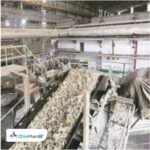As the Indian government has permitted sugar mills and distilleries to produce ethanol from sugarcane juice, sugar syrup, B-heavy molasses (BHM), and C-heavy molasses (CHM) during the Ethanol Supply Year (ESY) 2025–26 without any restrictions, the sugar industry believes this move will help arrest the decline in sugar prices.
Tarun Sawhney, Vice Chairman & Managing Director of Triveni Engineering and Industries Ltd (TEIL), while speaking to ChiniMandi, said, “At Triveni Engineering & Industries Ltd., we welcome the government’s decision to allow sugar mills and distilleries to produce ethanol without any restrictions during the 2025–26 Ethanol Supply Year. This is a timely and positive development, particularly considering higher sugar production expected in sugar season 2025-26. The ability to divert about 5 million tonnes of sugar towards ethanol in 2025–26 will help the mills balance stocks, stabilise prices, and ensure timely payments to farmers. At the same time, mills will benefit from quicker realisations through Oil Marketing Companies (OMC), reducing reliance on above-quota sugar sales for working capital during the crushing season.”
Mr. Sawhney believes that the absence of restrictions will help prevent a further fall in sugar prices. He stated that the unrestricted diversion is a critical step to help arrest a decline in sugar prices, improve mill cash flows, and accelerate loan repayments. With global analysts projecting initial sucrose availability of 35–36.5 million tonnes in 2025–26 against domestic needs of about 31 million tonnes, this policy provides much-needed flexibility to address surplus stocks at a time of weak export parity. The Food Ministry’s decision, in coordination with the Petroleum Ministry, to periodically review diversion levels of sugar (sucrose) to ethanol production vis-a-vis production of sugar will also ensure that the sweetener remains adequately available for domestic consumers throughout the year.
“Moreover, this move is aligned with India’s broader energy goals under the Ethanol Blended Petrol (EBP) Programme, where India has successfully achieved 20% ethanol blending in petrol in 2025, five years ahead of its target and now exploring the roadmap to achieve higher blending targets,” he further added.
This measure is part of the ongoing efforts to promote ethanol blending in fuel while ensuring sufficient sugar availability for domestic consumption.
In a circular issued by the Department of Food and Public Distribution (DFPD) to sugar mills and distilleries, it is stated that sugar mills and distilleries are allowed to produce ethanol from sugarcane juice/sugar syrup, BHM as well as CHM during ESY 2025-26 without any restriction.
DFPD, in coordination with the Ministry of Petroleum and Natural Gas (MoPNG), will periodically review the diversion of sugar to ethanol production vis-a-vis production of sugar in the country so that availability of sugar for domestic consumption is ensured throughout the year.



















[…] Source : Chinimandi […]